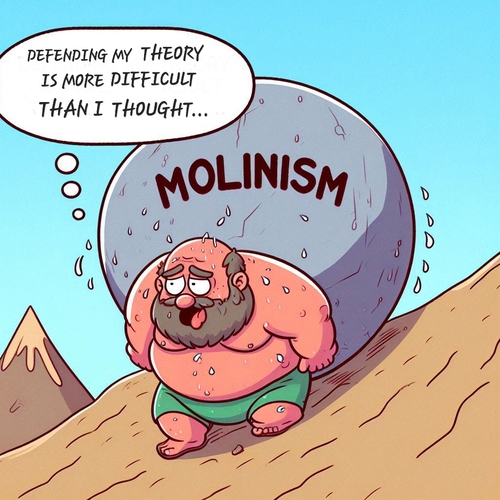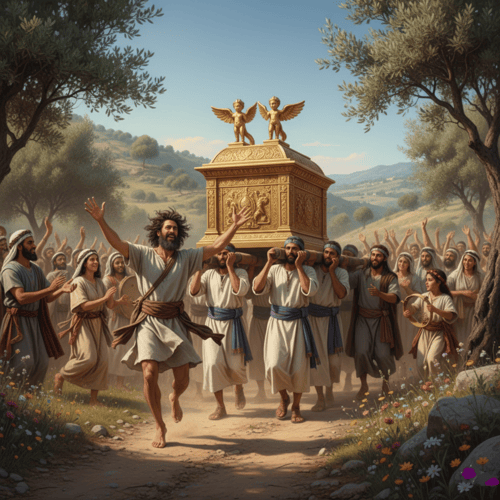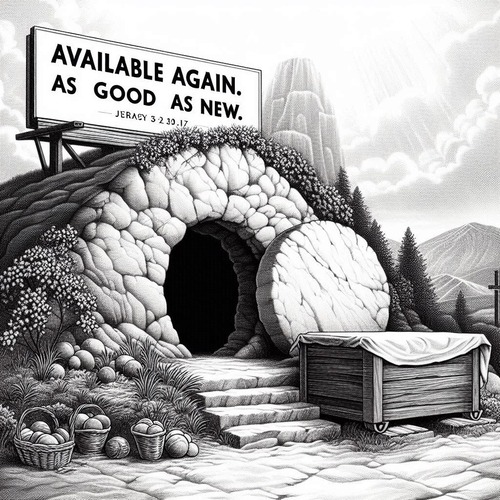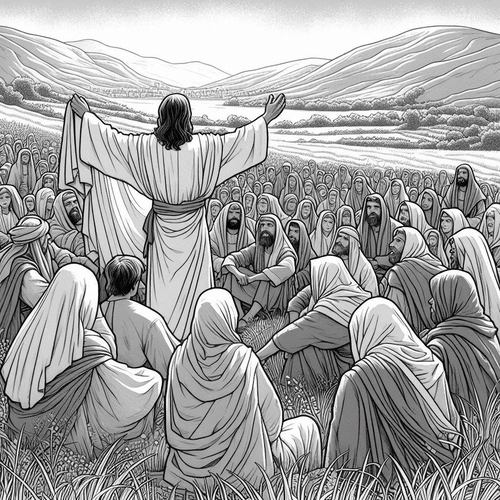Sacred Fury: What Christ’s Temple Cleansing Truly Means
Mark 11 records the crack of a handmade whip that echoed through the temple corridors. Tables crashed to the ground, scattering coins across stone floors. Bleating animals stampeded toward the exits as merchants fled in terror. No this isn’t the “gentle Jesus, meek and mild” of popular imagination, but the Son of God venting sacred fury, His eyes blazing with fire as He cleanses the temple.
The Temple Cleansing encapsulates Christ’s entire earthly mission in one dramatic, unforgettable act. When Jesus entered Solomon’s porticos and saw what mankind had made of His Father’s house, His heart was shattered. The very place designed for encountering the Holy God had become a marketplace of religious commerce. But this corruption was merely a picture—a devastating preview of what sin does to the human heart, the true temple of the living God.
THE CORRUPTED TEMPLE: A PICTURE OF FALLEN HUMANITY
Scripture reveals a heartbreaking transformation in what should have been sacred space. The Court of the Gentiles, designed as a place where non-Jews could seek the true God, had become a bazaar of exploitation and empty ritual.
- The Court of the Gentiles had become a marketplace of greed. What was meant to be a house of prayer for all nations (Isaiah 56:7) had degenerated into a “den of robbers” (Jeremiah 7:11). Money changers exploited pilgrims with inflated exchange rates, while merchants sold sacrificial animals at exorbitant prices. The very space meant for seeking God had become a place of financial manipulation.
- This mirrors the natural corruption of every human heart. Reformed theology teaches us that we are temples of the Holy Spirit (1 Corinthians 3:16-17, 6:19-20), yet our total depravity ensures we naturally turn sacred spaces into markets for self-interest. Just as the temple merchants prioritized profit over prayer, we instinctively transform worship into spiritual commerce—seeking what God can do for us rather than who He is.
- Every believer’s heart tends toward spiritual marketplace mentality. We subtly negotiate with God, offering our service in exchange for His blessings. We turn prayer into transaction, worship into performance, and discipleship into a business arrangement. The same corruption that turned the temple into a market infiltrates our hearts daily, making us merchants rather than worshippers.
DIVINE ZEAL: THE HEART BEHIND THE ACTION
“Zeal for your house will consume me” (John 2:17, Psalm 69:9). These weren’t the actions of someone having an emotional breakdown—this was the calculated, purposeful response of perfect holiness confronting absolute corruption.
This sacred fury reveals the very heart of God. In Reformed understanding, Christ’s righteous indignation wasn’t uncontrolled anger but holy zeal burning for the Father’s glory. Every crack of that whip, every overturned table, every shouted word pulsed with divine love for true worship. As John Calvin noted, this zeal consumes everything that obscures God’s glory—not in destructive rage, but in purifying fire.
What stirs this same zeal in our churches today? When worship becomes entertainment, when the gospel becomes a product to market, when God’s house becomes a platform for human glory—the same sacred fury that drove Jesus to action still burns in His heart. The question isn’t whether Christ’s zeal still exists, but whether we’ve grown so accustomed to spiritual commerce that we can no longer recognise it.
THE CLEANSING MISSION: FROM CORRUPTION TO CONSECRATION
Christ didn’t cleanse the temple merely to make a point—He came as the Great Cleanser, on a mission to purify what sin had utterly corrupted. This cleansing work extends far beyond one dramatic day in Jerusalem.
Christ’s progressive cleansing of the believer’s heart through sanctification. John Owen taught mortification of sin is the believer’s lifelong work, enabled by Christ’s ongoing cleansing power. Just as Jesus systematically drove out every merchant and overturned every table, the Spirit works to identify and eliminate every area of spiritual corruption in our hearts. This isn’t a one-time event but a daily process of allowing Christ access to examine and purify every corner of our lives.
Christ’s ongoing purification work in His church. Ephesians 5:25-27 reveals that Christ gave Himself for the church “to make her holy, cleansing her by the washing with water through the word, and to present her to himself as a radiant church, without stain or wrinkle or any other blemish.” The same zeal that drove Him to cleanse the physical temple now drives His work in the church, purging false teaching, spiritual pride, and worldly compromise.
The ultimate purification at Christ’s return. Malachi 3:1-4 prophesies of the coming day when the Lord will suddenly come to His temple like “a refiner’s fire and a launderer’s soap.” The cleansing that began in Jerusalem will reach its culmination when Christ returns to establish perfect worship in the new heaven and earth. Every trace of corruption will be forever banished from God’s presence.
The painful but necessary work of spiritual house-cleaning. True sanctification hurts. When Christ begins His cleansing work in us, it feels like tables crashing and coins scattering. Cherished idols must go. Comfortable sins must be abandoned. Religious performances must be exposed as empty theatre. But this painful process leads to the unspeakable joy of pure worship and genuine intimacy with God.
THE BELIEVER AS TEMPLE: PERSONAL APPLICATION
The stunning truth of 1 Corinthians 6:19 should take our breath away: “Do you not know that your bodies are temples of the Holy Spirit, who is in you, whom you have received from God?” The same God who demanded perfect holiness in Solomon’s temple now dwells within every believer.
- We must allow Christ daily access to cleanse our hearts. Just as the temple required daily sacrifices and constant maintenance, our hearts need regular spiritual house-cleaning. This means inviting Christ to examine our motives, our priorities, our secret thoughts, and our hidden compromises. It means giving Him permission to overturn whatever tables He finds cluttering the sacred space of our hearts.
- Specific areas requiring Christ’s cleansing attention include spiritual commerce. We must identify where we’re “selling” spiritual things for worldly gain—using our faith for social advancement, leveraging our testimony for personal benefit, or treating our relationship with God as a transaction. Christ’s whip of cords is aimed at every area where we’ve turned worship into business.
- Religious pride and performance must be ruthlessly exposed. Perhaps nothing angered Jesus more than empty religious ritual masquerading as genuine devotion. The Spirit continues His cleansing work by revealing our subtle Pharisaism—the ways we perform for others’ approval rather than worship from the heart, the ways we measure ourselves against other believers rather than against Christ’s perfect standard.
- Sanctification is lifelong temple maintenance. Unlike the Jerusalem temple that required external cleansing, we have the indwelling Spirit performing constant purification work within us. This ongoing sanctification is both God’s work and our responsibility—we must cooperate with the Spirit’s cleansing while recognizing that the power for change comes entirely from Him.
EMBRACING THE GREAT VICTORY
Here lies the magnificent truth that transforms everything: Christ’s temple cleansing wasn’t just historical drama—it was prophetic victory. The same zeal that drove Him to purify the Jerusalem temple has already secured the complete cleansing of every believer’s heart.
When Christ drove out the money changers, He was demonstrating the victory He would soon accomplish through His death and resurrection. By His blood, He has already cleansed us from all unrighteousness (1 John 1:9). By His Spirit, He continues the sanctification process that will culminate in our perfect presentation before the Father.
Will we resist or welcome Christ’s ongoing cleansing work? The choice is ours, but the victory is already His. The same sacred fury that blazed in the temple courts now burns with love for our complete transformation. He who began this good work in us will surely bring it to completion. What tables is He asking to overturn in our hearts today?
WHAT CHRIST’S TEMPLE CLEANSING MEANS: RELATED FAQs
How does the temple cleansing reveal Jesus’ divine authority and power? The most striking aspect of the temple cleansing is what didn’t happen—not a single person dared challenge Jesus’ authority to single-handedly shut down the entire temple commerce system. Armed temple guards were reduced to helpless onlookers, as one man with a whip of cords drove out hundreds of merchants, overturned their tables, and commanded them to leave. This supernatural authority reveals Jesus’ divine nature; His mere presence and righteous anger against sin, corruption, and exploitation carried such power that even seasoned businessmen and religious officials dared not resist.
In fact, Mark 11 that presents the start of Christ’s final week before the cross, begins with an awesome display of Jesus’ divine status—the triumphal entry. He comes riding into town on a donkey in fulfilment of ancient prophecy, even as crowds chant ‘Hosanna’. We also read of Christ’s cursing of a fig tree that withered overnight—something only God can do.
- Are there Old Testament parallels to Christ’s temple cleansing? Indeed, there are many. Scripture reveals a consistent pattern of God-ordained cleansing throughout Israel’s history. Moses’ destruction of the golden calf (Exodus 32:19-20) demonstrates righteous fury against idolatry corrupting God’s people. Godly kings like Hezekiah systematically destroyed high places, sacred stones, and Asherah poles (2 Kings 18:4), while Josiah’s reforms included cleansing the temple of pagan vessels and removing idolatrous priests (2 Kings 23:4-20). Even God’s allowance of Babylon’s destruction of the temple served as divine judgment when His people persistently turned from true worship to idolatry (2 Chronicles 36:15-21).
- How do Reformed scholars interpret the temple cleansing? DA Carson emphasises the eschatological significance, viewing Christ’s action as inaugurating the new covenant age where true worship transcends physical temples. John MacArthur focuses on Christ’s divine authority being displayed through this act of judgement, demonstrating His messianic credentials. RC Sproul highlighted the connection between God’s holiness and His intolerance of corrupted worship, while Timothy Keller emphasised how the cleansing reveals both God’s heart for justice and His desire for authentic relationship over religious performance.
Did Jesus cleanse the temple once or twice? The Synoptic Gospels (Matthew, Mark, Luke) place the cleansing during Passion Week, while John records an earlier cleansing at the beginning of Jesus’ ministry. Many Reformed scholars, including John Calvin, accept two separate cleansings, suggesting the temple’s corruption was so entrenched it required multiple interventions. This interpretation emphasises both the persistence of human sin and Christ’s patient but firm commitment to purifying worship. The repetition also demonstrates that external reforms without heart transformation prove temporary.
- What specific religious practices was Jesus condemning? In addition to the obvious financial exploitation, Jesus was confronting the entire sacrificial system that had become corrupt and exclusive. The high priest’s family controlled the temple market, creating a monopoly that prevented the poor from accessing meaningful worship. Additionally, the noise and commercialisation had effectively eliminated the Court of the Gentiles as a place where non-Jews could seek God. Christ was dismantling barriers that religious leaders had erected between people and authentic worship of the true God.
- How does the temple cleansing relate to Christ’s prophecy about destroying and rebuilding the temple? When challenged about His authority to cleanse the temple, Jesus responded, “Destroy this temple, and I will raise it again in three days” (John 2:19). John clarifies that Jesus spoke of His body as the temple, prophetically linking the cleansing to His death and resurrection. This reveals that the physical temple cleansing was a sign pointing to the greater reality: Christ’s sacrifice would end the old temple system entirely and establish believers’ bodies as the new dwelling place of God’s Spirit.
Was Jesus’ use of physical force justified, and what does this teach about righteous anger? Reformed theology distinguishes between sinful human anger and Christ’s perfect righteousness. Jesus’ actions were calculated and purposeful, not emotional outbursts—He took time to make a whip of cords, indicating deliberate action. His force was directed at property and commerce, not persons, and served to protect true worship rather than advance personal interests. This demonstrates righteous indignation against sin and injustice, which when motivated by love for God’s glory and others’ welfare, can justify strong action.
WHAT CHRIST’S TEMPLE CLEANSING MEANS: RELATED FAQs
Editor's Pick

Did Joseph Sin in Marrying an Egyptian?
It’s a troubling question: if God forbade His people from foreign alliances, why was Joseph’s marriage to an Egyptian not [...]

Jacob’s Ladder: How Jesus Bridges Earth and Heaven
THE GOSPEL IN GENESIS 28... A stairway to heaven—humanity has always dreamt of one since the Fall. Every religion offers [...]

In the World But Not Of It: What John 17:14-16 Really Means
Scrolling through social media, we’re bombarded by voices shouting for our allegiance—politics, trends, ideologies. As Christians, we feel the tension: [...]

Is Molinism Biblical? Reformed Challenges to Middle Knowledge
In a world craving autonomy, does God truly reign supreme, or does He negotiate with human choices? The question lies [...]

Does the Bible Teach Purgatory? Scripture’s Clear Answer
Imagine standing at the very edge of eternity, wondering if the soul requires further cleansing before you enter heaven's gates. [...]

David Danced Before the Lord—Why Don’t Reformed Churches?
When we read about King David leaping and dancing before the Lord “with all his might” (2 Samuel 6:14), a [...]

Faithful to the Pattern: Why Paul Reserves Ordination for Men
Few topics in contemporary Christianity generate more tension than women’s ordination. This question touches real lives, genuine callings, and deeply [...]

‘Flee Sexual Sin’: Why Does Paul Single This Sin Out?
When the apostle Paul writes to the Corinthian church, he doesn’t tell them to simply avoid sexual immorality or resist [...]

Does Denying God’s Sovereignty Mean Denying the Gospel?
RC Sproul once warned denying God’s sovereignty “eviscerates” grace—a strong word meaning to gut or disembowel something, leaving only an [...]

Why Christians Fast: The Biblical Discipline’s Very Real Rewards
Why would Christians, who rejoice in the good gifts of food and fellowship, deliberately choose to go without? Isn’t fasting [...]
SUPPORT US:
Feel the Holy Spirit's gentle nudge to partner with us?
Donate Online:
Account Name: TRUTHS TO DIE FOR FOUNDATION
Account Number: 10243565459
Bank IFSC: IDFB0043391
Bank Name: IDFC FIRST BANK






